Plymouth, Massachusetts, boasts a history as rich and enduring as any in the United States.
From its pivotal role as the landing site of the Mayflower Pilgrims in 1620 to its contributions to American democracy and culture, Plymouth’s story is a testament to resilience, innovation, and the pursuit of freedom.
This historic town, nestled along the shores of Cape Cod Bay, serves as a living museum of early colonial life, offering visitors the opportunity to walk in the footsteps of the Pilgrims and explore iconic landmarks such as Plymouth Rock and the Mayflower II.
As we delve into Plymouth’s past, we uncover tales of bravery, cooperation with Indigenous peoples, and establishing democratic principles that continue to shape our nation.
Join us on a journey through the rich tapestry of Plymouth, Massachusetts, history, where the echoes of the past resonate with timeless significance. So, stay sharp.
What Is Plymouth in Massachusetts?
Plymouth, Massachusetts, with a population of 492,066, was established in 1620 by English Separatists seeking religious freedom.
Fleeing England aboard the Mayflower, they aimed to create a Utopian community where they could practice their faith without persecution. On their journey, they formulated governance rules for the nascent colony.
Plymouth holds significant historical importance as the landing site of the Mayflower Pilgrims, marking the beginning of European settlement in New England.
The town is synonymous with the iconic Plymouth Rock, believed to be the first place the Pilgrims stepped ashore.
Today, Plymouth is a thriving community with a rich heritage, attracting visitors worldwide to explore its historic landmarks, museums, and cultural sites commemorating the Pilgrims’ legacy.
The Arrival of the Pilgrims in Plymouth, Massachusetts History
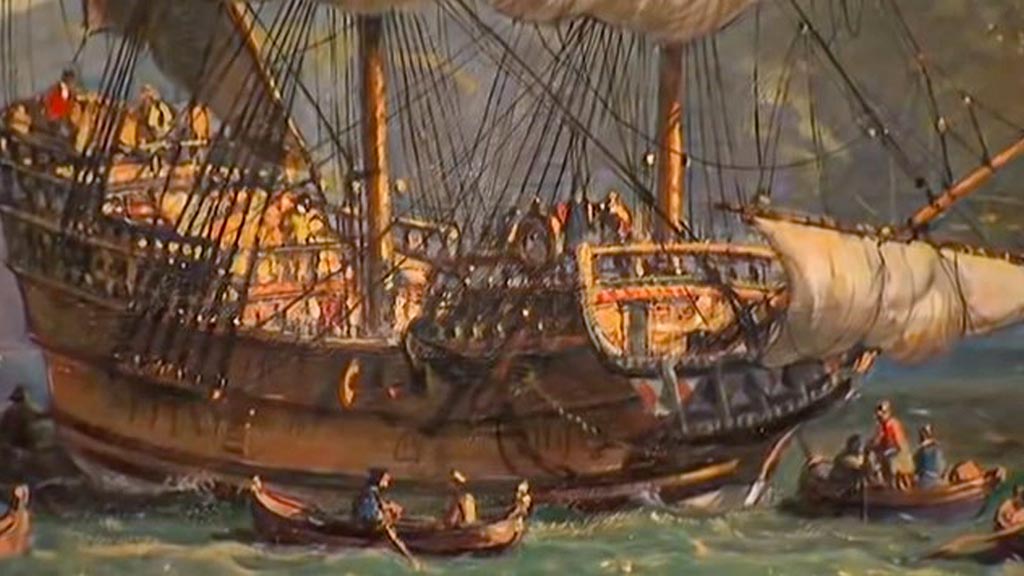
The arrival of the Pilgrims in Plymouth, Massachusetts, stands as a cornerstone event in American history, marking the beginning of European colonization in New England.
In 1620, English Separatists seeking religious freedom landed on the shores of Plymouth, where they established a settlement and laid the foundations for what would become a significant chapter in the story of America.
Establishment of a New Community
The Pilgrims, aboard the Mayflower, sought to create a new community where they could practice their faith freely, away from the religious persecution they faced in England.
Landing in Plymouth, they established a compact outlining the governance of their new colony, setting a precedent for democratic governance in the New World.
Harsh Beginnings
Upon arrival, the Pilgrims faced harsh conditions, including a harsh winter and a lack of food and shelter.
With perseverance and assistance from local Indigenous peoples, notably the Wampanoag, they managed to survive and build their settlement.
First Thanksgiving
The Pilgrims’ first successful harvest in 1621 was celebrated with a feast, now commonly called the first Thanksgiving.
This event symbolizes the spirit of cooperation between the Pilgrims and the Wampanoag, highlighting the importance of mutual respect and understanding in the early colonial period.
Legacy and Historical Significance
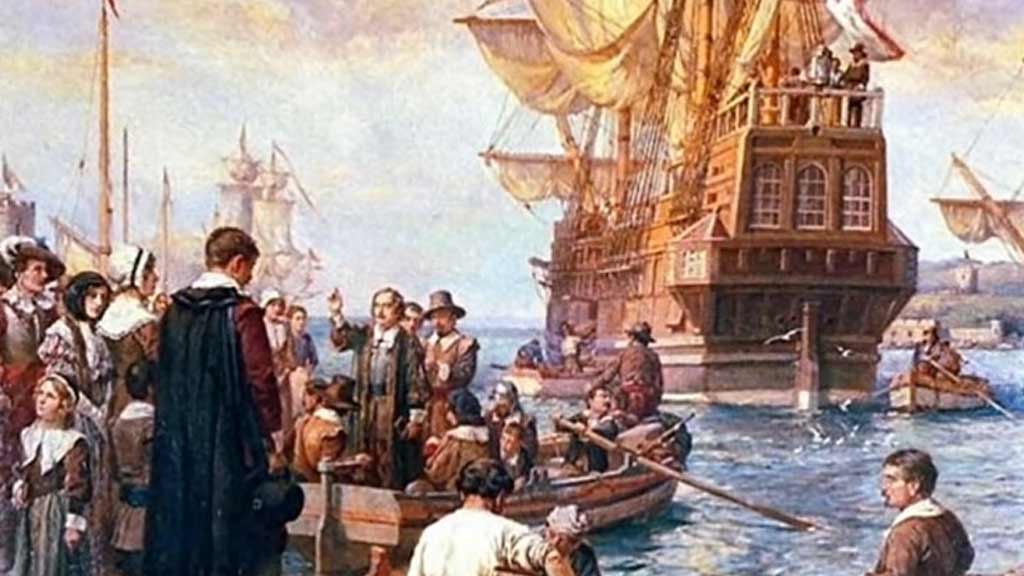
Plymouth’s role as the landing site of the Mayflower Pilgrims has left an indelible mark on American history.
The story of their journey, struggles, and eventual success symbolises perseverance, religious freedom, and the beginnings of American democracy.
Plymouth Rock, where tradition holds that the Pilgrims first stepped ashore, remains a revered historical landmark, drawing visitors worldwide to pay homage to this pivotal historical moment.
Commemoration and Preservation
Today, Plymouth honours its rich history through various museums, monuments, and educational programs dedicated to preserving the legacy of the Pilgrims.
Sites such as Plimoth Plantation, the Mayflower II replica ship, and the Pilgrim Hall Museum offer immersive experiences and artefacts that provide insight into the Pilgrims’ lives and their impact on American society.
These efforts ensure that the story of the Pilgrims’ arrival in Plymouth continues to be told and remembered for generations to come.
The Founding of Plymouth Colony
The founding of Plymouth Colony marks a pivotal moment in American history, representing the earliest permanent European settlement in New England. Here are the key points regarding the founding of Plymouth Colony:
Religious Persecution
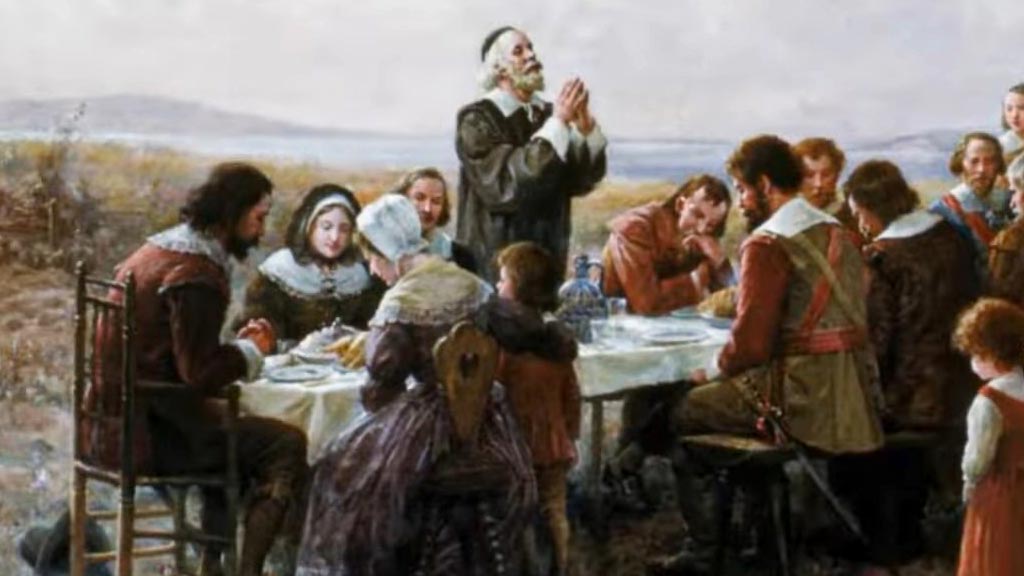
The origins of Plymouth Colony can be traced back to the religious turmoil in England during the early 17th century.
A group of English Separatists, also known as Pilgrims, sought to break away from the Church of England due to disagreements over religious practices and beliefs. Facing persecution and restrictions on their religious freedom, they sought refuge elsewhere.
Voyage of the Mayflower
In 1620, a group of around 100 Separatists set sail aboard the Mayflower, seeking a new home where they could freely practice their faith.
After a treacherous journey across the Atlantic Ocean lasting over two months, they reached the shores of present-day Massachusetts.
Landing at Plymouth
On December 21, 1620, the Mayflower passengers landed at Plymouth Harbor, establishing the first permanent European settlement in New England.
The harsh winter conditions and lack of provisions challenged the settlers as they began building their colony.
The Mayflower Compact
Before disembarking, the Pilgrims drafted and signed the Mayflower Compact, a foundational document that established a framework for self-government and mutual consent among the settlers.
This early form of democratic governance laid the groundwork for future American political institutions.
Interactions with Indigenous Peoples
The Pilgrims’ arrival in Plymouth brought them into contact with the region’s Indigenous peoples, notably the Wampanoag tribe.
Through interactions and alliances with Indigenous leaders such as Squanto and Massasoit, the settlers learned essential survival skills and established peaceful relations, which were crucial to the colony’s survival in its early years.
Growth and Development
Despite the initial hardships, Plymouth Colony gradually grew and prospered, attracting more settlers and expanding its territory.
The colony relied on agriculture, fishing, and trade for its economic sustenance, and its population steadily increased over the years.
Legacy and Impact
The founding of Plymouth Colony holds significant historical significance as it symbolizes the enduring principles of religious freedom, self-government, and perseverance in the face of adversity.
The Pilgrims’ story has become ingrained in American mythology, celebrated annually during Thanksgiving as a reminder of the ideals and values upon which the nation was founded.
Growth and Development of the Plymouth Colony
The growth and development of Plymouth Colony were characterized by perseverance, adaptation, and the establishment of institutions that laid the foundation for future settlements in New England. Here are the key aspects of the colony’s growth and development:
Agricultural Expansion
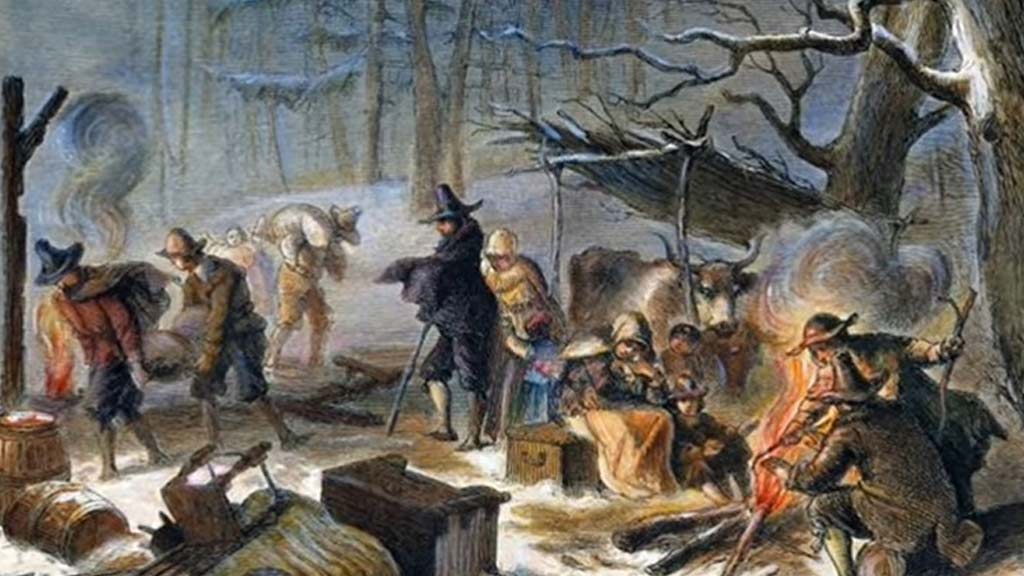
Agriculture played a central role in the growth of Plymouth Colony. Despite the challenges of the rocky soil and harsh climate, settlers cultivated crops such as corn, beans, squash, and wheat, adopting farming techniques taught to them by Indigenous peoples.
The success of agriculture provided a reliable food source and contributed to the colony’s economic stability.
Trade and Commerce
Plymouth Colony traded with Indigenous tribes and other European settlements along the Atlantic coast.
The colony exported goods such as fish, furs, lumber, and agricultural products in exchange for essential supplies and manufactured goods.
Trade networks helped stimulate economic growth and fostered connections with neighbouring communities.
Land Expansion and Settlement
Over time, Plymouth Colony expanded its territory through land purchases, treaties with Indigenous tribes, and the establishment of outlying settlements.
Settlers moved beyond the original Plymouth settlement to establish new towns and villages, furthering the region’s colonisation.
Religious and Social Institutions
The Pilgrims who founded Plymouth Colony were guided by religious principles and a sense of community. They established churches, schools, and civic institutions to foster religious worship, education, and governance.
These institutions played a vital role in shaping the social fabric of the colony and maintaining order within the community.
Population Growth and Immigration
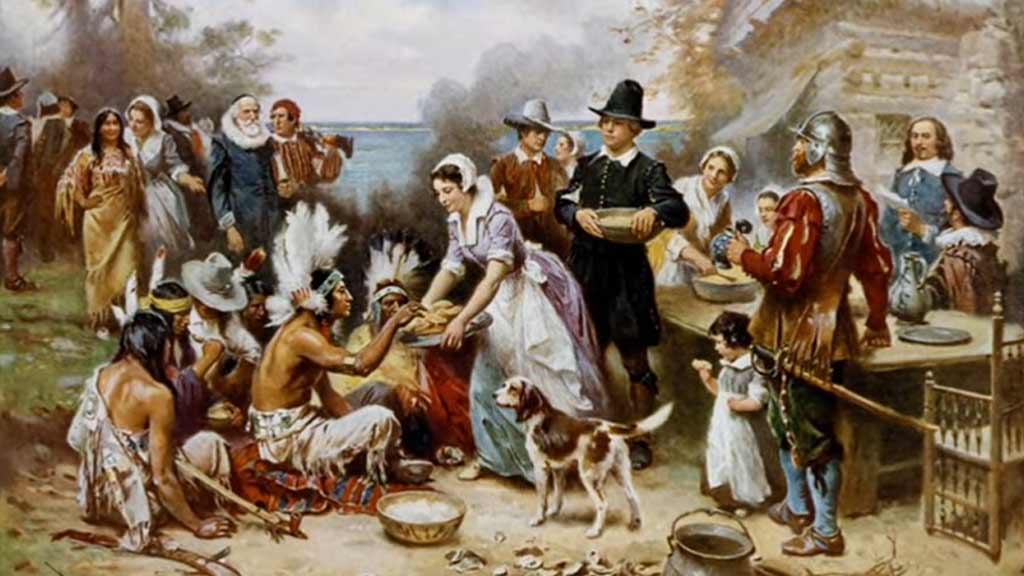
Despite early challenges and hardships, Plymouth Colony experienced steady population growth through natural increase and immigration.
Additional settlers from England sought economic opportunities, religious freedom, and a new start in the New World. The influx of new residents contributed to the colony’s demographic diversity and vitality.
Conflict and Resolution
Plymouth Colony faced occasional conflicts with Indigenous tribes, neighbouring European colonies, and internal disputes among settlers.
However, diplomatic efforts, alliances with Indigenous allies, and legal frameworks helped resolve conflicts and maintain relative peace and stability within the colony.
Legacy and Influence
The growth and development of Plymouth Colony laid the groundwork for the expansion of European settlement in New England and influenced the development of American society and institutions.
The colony’s commitment to religious freedom, self-government, and community cooperation left a lasting legacy that continues to shape the identity and values of the United States.
Impact of Plymouth on Massachusetts History
The impact of Plymouth on Massachusetts history is profound, shaping the region’s trajectory and leaving a lasting legacy that continues to resonate to this day. Here are key aspects of Plymouth’s influence on Massachusetts history:
Founding of the Massachusetts Bay Colony
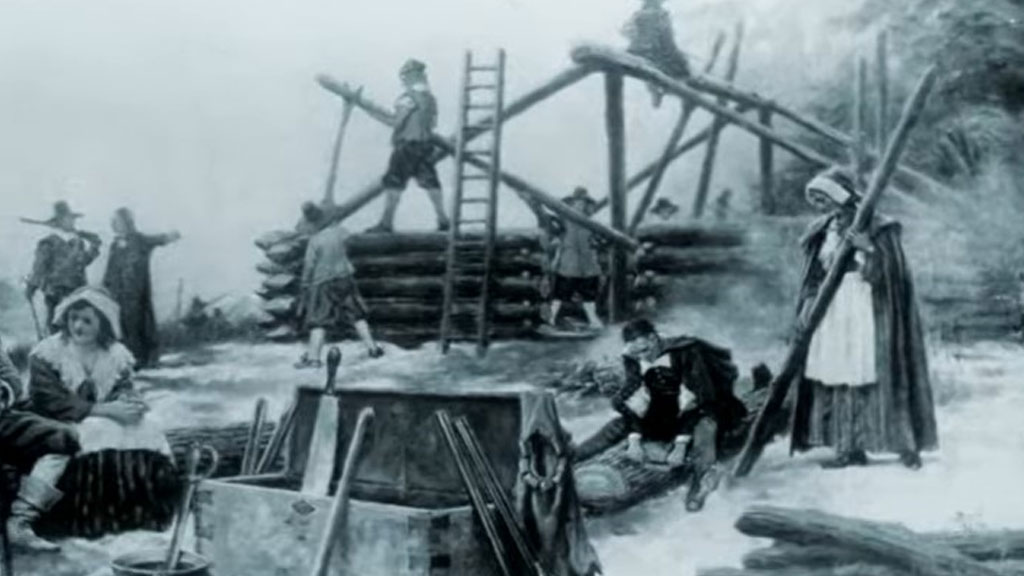
Plymouth Colony served as a precursor and inspiration for the founding of the Massachusetts Bay Colony in 1630.
The success and lessons learned from Plymouth’s early years influenced the Puritan settlers who established the Massachusetts Bay Colony, contributing to the broader colonization of New England.
Development of Democratic Governance
The Mayflower Compact, signed by the Pilgrims upon their arrival in Plymouth, established a self-government framework based on the governed’s consent.
This early experiment in democracy laid the groundwork for representative government in Massachusetts and later in the United States.
Religious Freedom and Tolerance
Plymouth Colony was founded by English Separatists seeking religious freedom, and its inhabitants practised a form of religious tolerance uncommon in Europe at the time.
The principles of religious freedom and tolerance championed by the Pilgrims influenced the development of Massachusetts as a refuge for religious dissenters and minorities.
Cultural and Educational Institutions
Plymouth played a significant role in establishing cultural and educational institutions in Massachusetts.
The Pilgrims founded churches, schools, and libraries to foster religious worship, education, and community cohesion.
These institutions served as precursors to the robust educational and cultural infrastructure that developed in Massachusetts over time.
Thanksgiving Tradition
The Pilgrims’ celebration of the first Thanksgiving in Plymouth in 1621 has become an enduring symbol of American unity and gratitude.
With its roots in Plymouth Colony, the Thanksgiving tradition remains an important cultural and historical event celebrated across Massachusetts and the United States.
Symbol of American Identity
Plymouth Colony occupies a central place in Americans’ collective memory and identity.
Its story of perseverance, cooperation with Indigenous peoples, and the quest for religious freedom embodies fundamental values and ideals Americans cherish.
Plymouth Rock, the Mayflower II, and other historic landmarks in Plymouth are tangible reminders of the colony’s enduring legacy.
Tourism and Heritage Preservation
Plymouth’s historical significance attracts tourists and visitors worldwide, contributing to the local economy and fostering appreciation for Massachusetts history.
Efforts to preserve and interpret Plymouth’s heritage through museums, monuments, and educational programs ensure that the legacy of Plymouth Colony continues to be remembered and appreciated by future generations.
FAQs
What role did the Mayflower Compact play in Plymouth’s history?
The Mayflower Compact, signed by the Pilgrims upon their arrival, established a framework for self-government based on the consent of the governed.
It laid the groundwork for democratic principles and governance in Plymouth Colony, serving as a precursor to American constitutional democracy.
How did Plymouth Colony interact with Indigenous peoples?
Plymouth Colony had complex interactions with Indigenous tribes, notably the Wampanoag.
Despite initial tensions, alliances were formed, mutual aid was exchanged, and treaties were negotiated, leading to periods of cooperation and peace.
These interactions shaped the colony’s survival and its approach to Indigenous relations.
What is the significance of Plymouth Rock?
Plymouth Rock is traditionally believed to be where Pilgrims first stepped ashore in 1620.
While its exact historical significance is debated, it remains a powerful symbol of American heritage and pilgrimage, drawing visitors to Plymouth to commemorate the Pilgrims’ arrival and legacy.
How has Plymouth’s history influenced modern-day Massachusetts?
Plymouth’s history has left an indelible mark on modern-day Massachusetts, shaping its cultural identity, governance structures, and tourism industry.
The values of religious freedom, democratic governance, and cooperation with Indigenous peoples continue to resonate in the state’s ethos and historical narrative.
Wrapping Up
The history of Plymouth, Massachusetts, is a rich tapestry of resilience, democracy, and cultural exchange.
From the Pilgrims’ arrival aboard the Mayflower to establishing democratic governance and enduring traditions like Thanksgiving, Plymouth’s legacy inspires and shapes American identity.
Its role as the birthplace of religious freedom, the Mayflower Compact, and the Thanksgiving tradition underscores its profound impact on Massachusetts and the nation as a whole.
Through preservation efforts and ongoing interpretation, Plymouth’s history remains accessible and relevant, offering valuable lessons about cooperation, diversity, and the enduring quest for freedom and equality. Best of luck.
Jaclyn Lowe